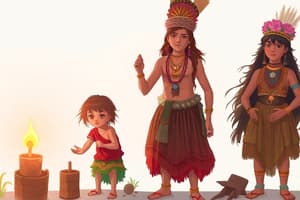Podcast
Questions and Answers
What are the three major lakes significant to the T'boli?
What are the three major lakes significant to the T'boli?
Sebu, Siluton, and Lahit
The position of a datu in T'boli society is hereditary.
The position of a datu in T'boli society is hereditary.
False (B)
Which of the following statements is true about T'boli marriages?
Which of the following statements is true about T'boli marriages?
- Marriages are always conducted within a year.
- Marriages can be arranged by parents. (correct)
- The crowning celebration is called moninum. (correct)
- Men are not allowed to have more than one wife.
The T'boli believe that death is a trick played by the ______.
The T'boli believe that death is a trick played by the ______.
Who are the supreme deities of the T'boli?
Who are the supreme deities of the T'boli?
What is the purpose of the T'boli dance called Kadal Heroyon?
What is the purpose of the T'boli dance called Kadal Heroyon?
What offerings do the T'boli make to placate malevolent spirits?
What offerings do the T'boli make to placate malevolent spirits?
The T'boli society permits the practice of monogamy only.
The T'boli society permits the practice of monogamy only.
What is the significance of the muhen in T'boli belief?
What is the significance of the muhen in T'boli belief?
Flashcards are hidden until you start studying
Study Notes
The T'boli Tribe
- An indigenous people living in South Cotabato, Philippines
- Located in the Tiruray highlands, a triangle formed by Suralla, Polomolok, and Kiamba
- Occupy an area with three important lakes: Sebu (largest and culturally significant), Siluton (deepest), and Lahit (smallest)
- Legend tells that T'boli ancestors survived a great flood by taking shelter in a huge bamboo
- Anthropologists believe they are of Austronesian stock with agricultural practices
- Their society is ruled by datus with varying degrees of power and influence
- Datus are not hereditary and assume several roles: social, economic, religious, and political
- No datu is superior to another, but deferential treatment may be shown
T'boli Marriage and Customs
- Kesiyahan or marriage is a long process that may be conducted in three major stages: childhood, puberty, and adolescence, culminating in a ceremony called moninum
- Marriage is prearranged by parents and can be contracted at any age
- Moninum is a series of six feasts, hosted alternately by the bride and groom's families
- Done over a period of 2 to 6 years, it is an optional celebration typically only for wealthy T'boli
- Polygamy is practiced; a man can have as many wives as he can afford to support
- Having multiple wives is considered a status symbol
T'boli Beliefs and Practices
- Death is not seen as inevitable but a trick by evil spirits (busao) or a punishment from gods
- The belief is that one's spirit leaves the body during sleep, and death happens when it doesn't return
- Supreme deities are a married couple: Kadaw La Sambad (sun god) and Bulon La Mogoaw (moon goddess), residing in the seventh heaven
- They have seven sons and daughters who marry each other
- Cumucul, the eldest son, is married to Boi Kabil Sfedad, and the second son is married to Bong Libun
- Muhen is considered the god of fate; its song is believed to presage misfortune
- Busao are malevolent spirits that cause misfortune and illness
- Desu (propitiatory offerings) are made to appease evil spirits
- Datus often preside over ceremonies and rites
- Dancing is a significant part of their culture, with gestures often symbolic
T'boli Culture and Identity
- Known for their colorful costumes, embroidered garments, beaded ornaments, bangles, bracelets, and brass link belts.
- Considered one of the most colorful Filipino groups
- Kadal Heroyon dance is a flirtation dance performed by young girls eligible for marriage proposals, with gestures imitating birds and acts of beautification
Studying That Suits You
Use AI to generate personalized quizzes and flashcards to suit your learning preferences.




